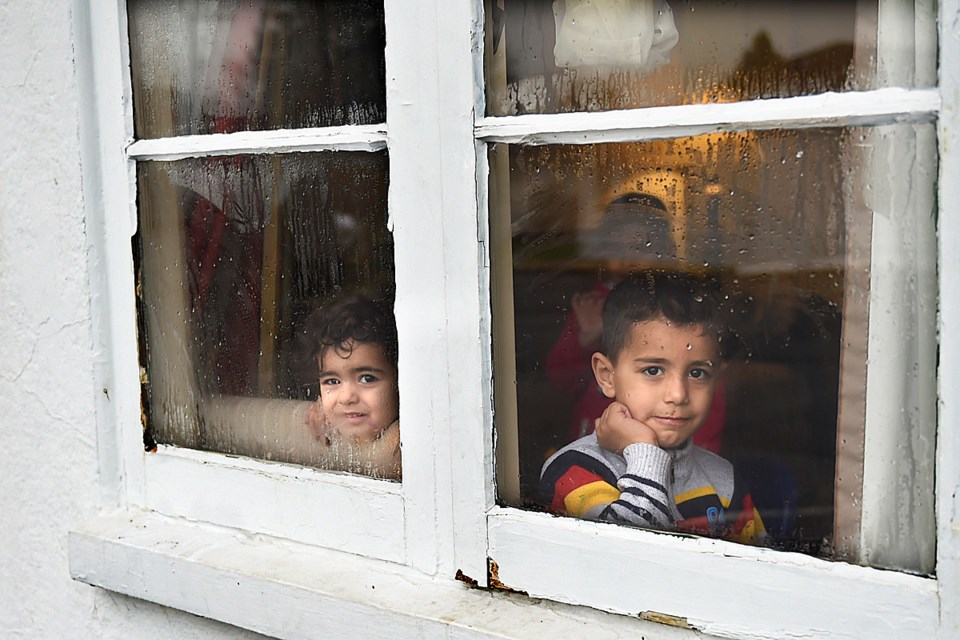Enroling his children in school, finding a permanent place to live, learning English and getting a job — all of it will eventually come together for Mansour Arafa and his family.
He’s confident of that.
But last Monday, as he sat in the living room of a roadside motel on Kingsway, he was simply relieved to have found peace for his wife Ghada and six children, aged 20 months to 17 years old.
“My kids were terrified and used to hide in closets,” said Arafa of his family’s life in Homs, the western Syrian city largely reduced to rubble in the country’s ongoing civil war. “Now, they are able to sleep. I’m not worried about them. They have smiles all the time.”
Arafa and his family are refugees. They were in Vancouver for 10 days when the 43-year-old chef spoke to the Courier, via an Arabic translator. The family first landed in Toronto, where they stayed briefly after arriving from Jordan in January.
On the morning of the Courier’s visit, most of the Arafa family had just finished breakfast. Three of the youngest children were watching cartoons. Two others were still asleep, while one of the teenagers quietly lingered on the edge of the living room, curious about the visitors.
The peace that has come to the family is more pronounced than imagined when they peer outside the windows of their motel room: Everywhere they look, Syrian refugees are sharing in the good fortune of their new home, Canada.
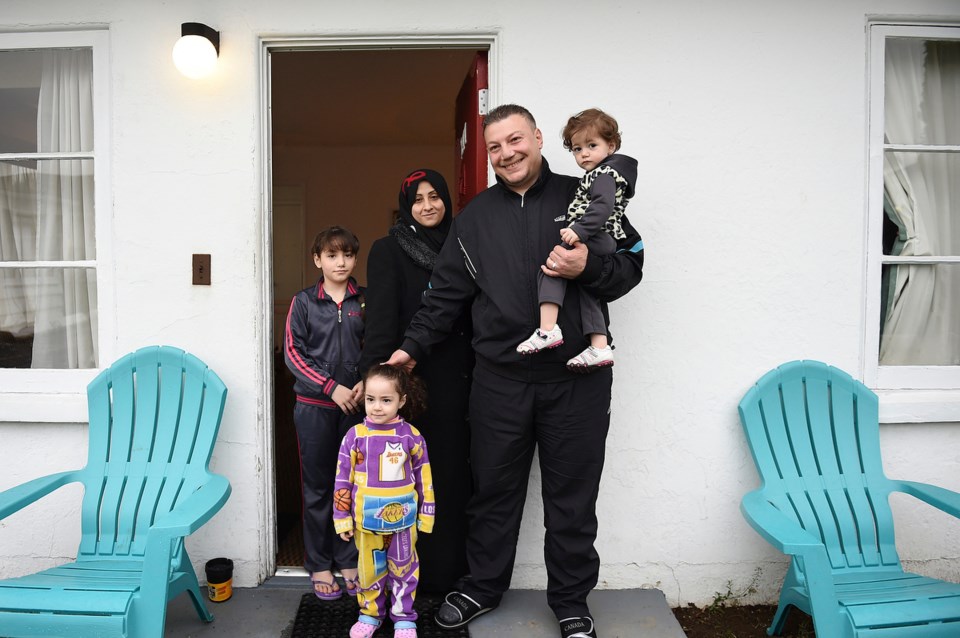
“For now, it is good for the kids to be with other Syrian kids,” said Arafa, as he held one of his daughters on his lap. “But this is temporary. They will soon go to school and meet new friends. This is important for our new life.”
The Arafa family is among 27 Syrian families either living in the bungalows at the iconic 2400 Court Motel on Kingsway, or residing in seven apartments across the street. Although both sites serve as temporary housing, the refugees’ presence has turned the strip of Kingsway into a small, Syrian community of more than 200 people.
In the courtyard of the motel, children run freely across the asphalt while men in winter coats huddle under a roof of one of the bungalows to avoid the rain. They smoke cigarettes, sip coffee and discuss their next moves.
Some families will find permanent housing this month, likely in Surrey, Coquitlam or Burnaby, the most popular destinations in Metro Vancouver for the refugees.
The larger the family, the more time it takes to find housing, with an 11-member family staying 37 days at the motel before moving to a farm in Maple Ridge.
Remarkably — but not surprisingly, given Vancouver’s affordability crunch — only two Syrian families of the 1,071 government-assisted refugees who arrived in B.C. since December have settled in the city.
Arafa has no preference of where he wants to live, having only been in Canada for a total of 20 days. He has heard it might take up to three weeks before he learns his new address.
“We are happy to be in Canada, we are happy not to be in a place where everyday our life just stopped,” he said, noting his family is the first among his relatives to live in Canada.
RECORD NUMBER OF SYRIAN REFUGEES EXPECTED THIS WEEK
Overseeing the challenge of matching the Arafa family and others with permanent housing is the Immigrant Services Society of B.C., which is the refugees’ first point of contact.
That challenge is about to become even greater this week, with more than 1,100 Syrian government-assisted refugees expected to land at Vancouver International Airport over 10 days.
Chris Friesen, the society’s director of settlement services, said the influx will be the largest number of government-assisted refugees to arrive in B.C. in the shortest period of time in history.
“We’re madly working with other communities throughout British Columbia to destine at least 500 of the refugees outside of Metro Vancouver,” said Friesen, noting 240 will settle in Victoria, 166 in Abbotsford and 30 in Nanaimo. Prince George and Vernon will also be destinations for the refugees. “We’ve got 14 full-time people and countless volunteers working on this. It’s a massive operation.”
While newcomers such as Arafa and his family wait for permanent housing, they are given a monthly allowance for shelter and food, escorted to health clinics for check-ups, assisted with opening a bank account and introduced to a variety of services, including English language training.
The city-owned 2400 Motel is one of nine temporary housing sites in Metro Vancouver for Syrian refugees. It also has the most tenants, with Vancouver’s Sandman, Marriott, Century Plaza and Landis hotels, the Pendrell apartments and the society’s “Welcome House” on Drake Street providing housing for another 300 people.
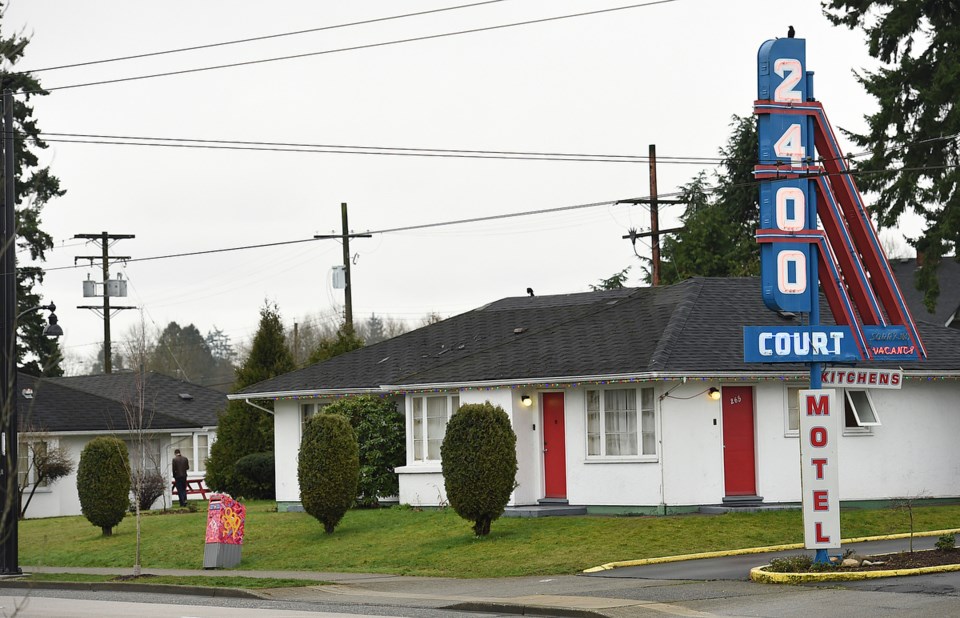
Word has gotten out in the community about the Syrians living on the strip of Kingsway. Two weeks ago, a group of students from Charles Tupper secondary school delivered school supplies, toiletries, clothing and grocery store gift cards to some of the Syrian children at the motel.
Teachers Jasmine Nann and Sally Ringdahl arranged the visit after students in Nann’s Grade 8 humanities class and Ringdahl’s literacy program wanted to do something for the Syrians.
“I think my students really expected the youth to be really sad because they’ve been through so much, which we all know,” Nann said. “But they were smiling and happy and really eager to get back to school. They just so desperately want to be where our kids are — in school, learning. Their questions were all about school, how do we get in, what does it look like.”
Last month, Collingwood Neighbourhood House turned its regular Monday night “all-nations” dinner into a Syrian dinner, which featured Syrian-style chicken, tabouli salad, rice and coconut cake for dessert.
More than 100 refugees from the motel attended, including dozens of children who were led in song (“...the wheels on the bus go round and round”) by library workers and given access to a computer room. Many received their first English books courtesy of non-profit society Books for Me.
Jennifer Gray-Grant, the neighbourhood house’s executive director, told the Courier on the night of the dinner that she and her staff wanted to do something to make the refugees feel welcome.
Gray-Grant pointed to a study the Vancouver Foundation conducted a few years ago where respondents’ number one concern about living in Metro Vancouver was being isolated and cut off from community.
“That’s why we exist — to blast out that sense of loneliness,” she said in an interview from her office. “We want to give people a sense of belonging. And that includes friendships, that includes a place to go where people know your name and a place to go where you feel you have something to contribute.”
In the kitchen, that friendship was on display as the neighbourhood house’s chef, Najia Elacel, worked with one of the Syrian men to prepare dinner.
Other volunteers in the kitchen were originally from Somalia, Sudan and China, all working with two First Nations people, one of whom opened the dinner with a welcoming prayer.
“This is a second heaven for us,” Raid Abazeed told the Courier after dinner. He, his wife and three-month-old daughter were residing at the 2400 Motel but have since moved to a basement suite in Surrey.
DAILY SHELLING OF HOMS
The gratitude shown by Abazeed, by Arafa and other families at the 2400 Motel dominated all conversations the Courier had with Syrian refugees.
But what was also made clear is they didn’t come to Canada to become a burden on the country. They left behind a life in Syria where they once worked and where their children went to school.
“Syrians are ambitious people,” Arafa said. “We have a lot of skills and we are hard workers. We want to get settled and education is a very key thing for us. I will get a job and integrate into the Canadian community and become Canadian. I now have opportunity.”
All opportunity was lost for him in Syria, where he recalled the daily shelling of his city, being detained and harassed by the military and women being raped.
Arafa fled in October 2011 to Jordan to secure housing for his family, who joined him a short time later. The family lived in Jordan until they received word from the office of the United Nations High Commissioner for Refugees that it had a spot for them in Canada.
“From when I was 16 or 17 years old, I heard that Canada was one of the most beautiful countries in the world,” he said. “I have now seen that with my own eyes.”
His home country, though, is not one he wanted to leave. But as his wife said, “We had no other choice.” Mansour elaborated, saying, “We were forced to leave because of the brutal and barbaric regime of [Syrian president Bashar al] Assad who is a number one blood sucker — a vampire.”
120 DAYS IN PRISON
The young man translating the Arafa couple’s words was 26-year-old Mohammed Alsaleh, also a Syrian refugee.
He arrived in Vancouver 15 months ago and knows too well the anger Mansour feels when he uses such language to describe the Assad regime.
Alsaleh said he spent 120 days in prison, where he was tortured for speaking out against the government. He attended protests and was active on social media when he was arrested.
“I was punished,” he said. “They knew I didn’t do anything, that I committed no crime or broke any law. But that’s the way they deal with their own citizens.”
He was eventually released and fled to Lebanon, where he stayed with relatives before being accepted as a government-assisted refugee in Canada.
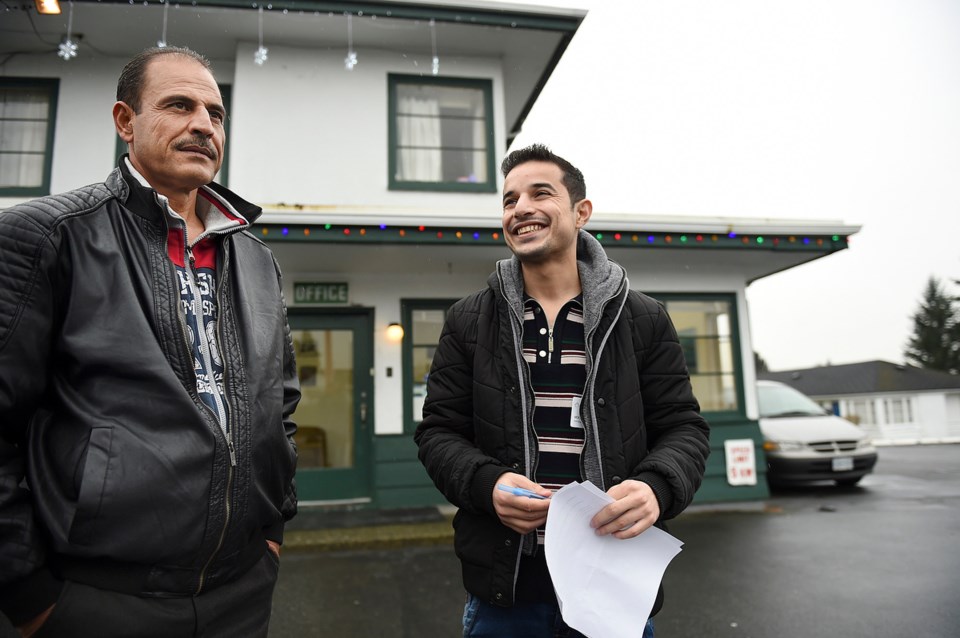
Alsaleh now lives in a $540-per-month room in a basement suite in New Westminster. Since arriving in Vancouver, he has made the best of his opportunity, having recently been hired as a resettlement counsellor with Immigrant Services Society of B.C. He also obtained a diploma from the health care assistant program at Drake Medox College in Vancouver. Some day, he said, he hopes to work in a hospital.
The highlight, though, of Alsaleh’s short time in Vancouver was meeting Prime Minister Justin Trudeau, whose government promised during the election campaign to accept 25,000 Syrian refugees to Canada by early March.
Alsaleh learned the prime minister would be taping a television program in Vancouver in December. So he went and became a member of the audience. He posed Trudeau a question: How could he get the rest of his family to Canada, if they had not been referred by the United Nations High Commissioner for Refugees? That question didn’t get a direct answer but led to a conversation after the television taping.
“That was a dream come true to meet him,” said Alsaleh, noting Trudeau told him of Canada’s historical commitment to welcoming refugees, whether they be assisted by the government or sponsored by private groups.
Alsaleh is now working with friends, who launched a crowd funding drive to privately sponsor some of his family to settle in Vancouver. They could be here by the summer.
“When I left Syria, I felt like I lost my home country. But after being here for more than a year, I feel this country of Canada has given me something priceless — a place to call home.”
He added: “Canada has healed my wounds. This is how Canada is awesome.”
HOSPITAL VISIT
The Arafa family, meanwhile, has another story to tell.
Actually, Ghada tells it.
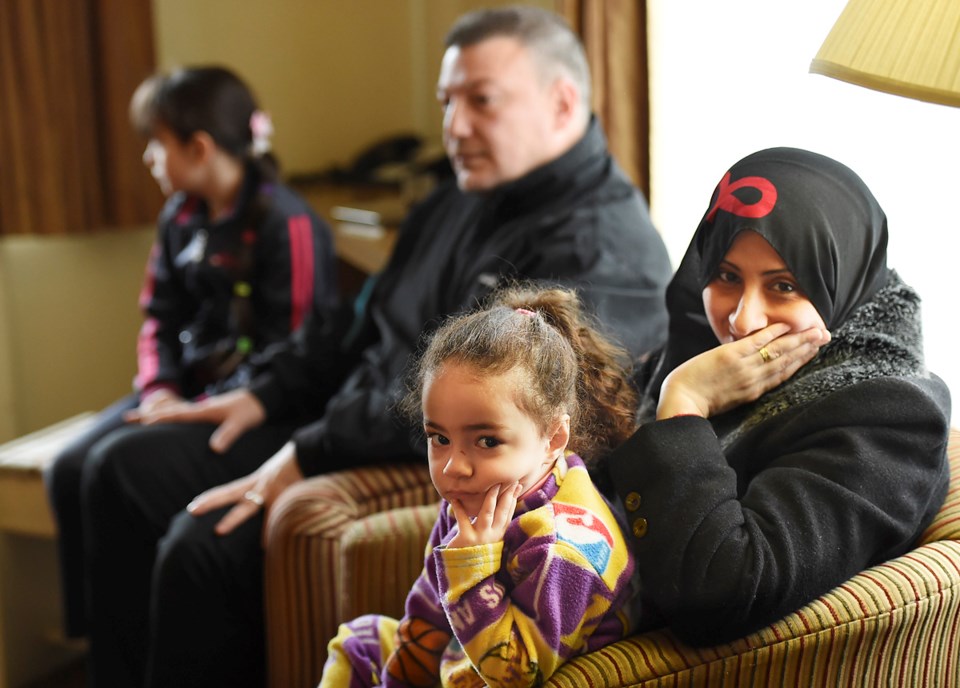
During the last 10 days at the motel, her 20-month-old daughter, Celeen, fell ill. She didn’t go into detail about the illness, but it was worrisome enough to call 911.
Paramedics arrived and took both daughter and mother to the hospital. It was an anxious time for the family — a new country and already an emergency.
In the end, the outcome only emphasized to Ghada and the family they made the right choice to come to Canada.
“The service was so good, the health care was so good and the medicine cured her,” she said, smiling and nodding her head in appreciation.
@Howellings
